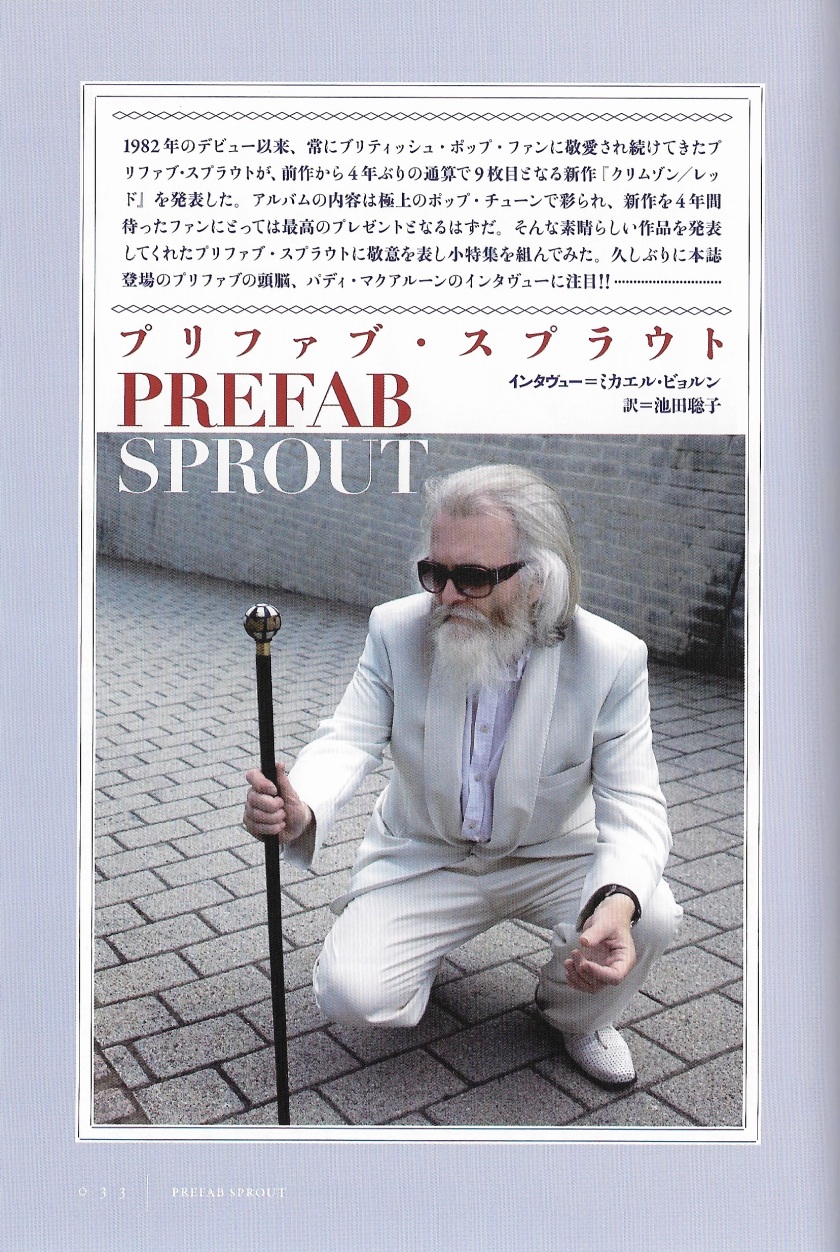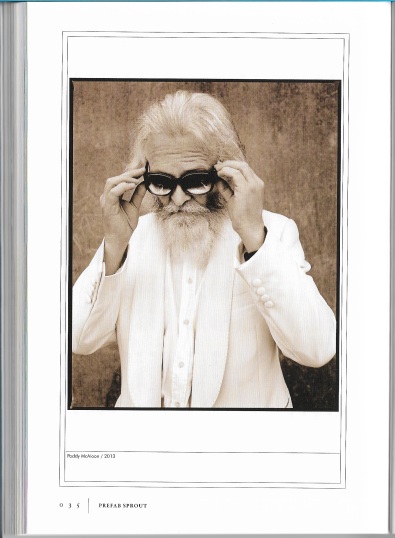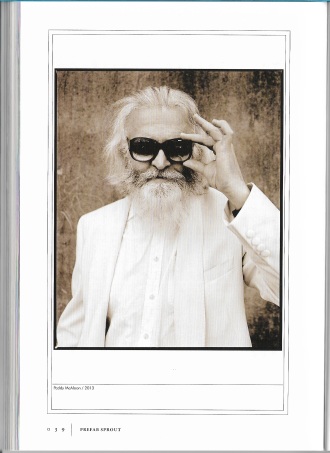In celebration of the February 2019 release of “I Trawl the Megahertz” as a Prefab Sprout album, we here republish an interview with Paddy McAloon, originally written by Michael Björn for Japanese music magazine Strange Days #170, pages 34-40, January 2014*.
Copyright © Michael Björn 2014

Although tinnitus hinders him from playing with other musicians and detached retinas in both eyes shadows his sight, Paddy’s musical genius remains unsoiled, like a force of nature. New album ‘Crimson/Red’ is almost as good as the early albums. A pop classic, simply put.
Paddy McAloon has not released newly recorded material since ‘I Trawl the Megahertz’, although partly re-recorded demos for the aborted Prefab Sprout album ‘Let’s Change the World with Music’ from 1993 were released four years ago. Hence, it is a great joy to welcome Him back, and my voice cracks up with sheer emotion at the beginning of this interview. Luckily, Paddy is not embarrassed, instead he is full of warm laughter and seems very relaxed. He appears satisfied with the good work he has completed – although, as you will find out, he had forgotten he had a deadline and just happened to miss it by several years.
First of all, I would like to express my gratitude for getting a new Prefab Sprout album.
Paddy: Thank you, ha ha! That is great, it is my pleasure to give it to you!
It is a fantastic album…. It was leaked on the Internet under the name ‘The Devil Came A-Calling’. Did you change the title or was it not the title?
Paddy: No, it is not the title. That’s clearly someone’s assumption from maybe the first song that they heard from the Internet. I considered calling it all sorts of things, ‘The Best Jewel Thief in the World’ and I considered ‘The Devil Came A-Calling’, but I never shared those thoughts with anyone. I didn’t want to give attention to any particular song by singling it out.
And had I called it ‘The Old Magician’, that would have just made it even more of a pressure than it has been in terms of the press saying: ”Well you look like some old wizard! Is that how you see yourself?” It was difficult for me to find a title; I wasn’t sure what to call it. Then I saw the two words lurking in the lyric of ‘Adolescence’. And I thought ‘Crimson/Red’. It has implications of passion and a kind of burning brightness and I wanted to call it something like that.
My son is ten years old, and although he is not an English native speaker, suddenly he sits there and very carefully listens to your lyrics and thinks about the meaning. How can you write lyrics that are very specific yet so universally applicable somehow?
Paddy: That is very kind of you to say. I don’t know. I particularly like ‘Adolescence’, it is one of my favourite songs, and I have a ten year old daughter. She was the first person to hear it, when I was working on it. And she said to me: ”Dad, has anyone heard this?” She got into that and she knows all the words to it too. I don’t know how that works.
All I can remember is, at that age myself, I was probably more curious about music than adults realised. You know, things that strike us when we are young, they seem to be enormously formative. Maybe your son is like you, and maybe my daughter is like me. That could be it; where that curiosity is there. Say hello to him from me! One of my youngest fans, so I must cultivate his attention very carefully! Ha ha ha!!

If you are ten today, there is just this flood of music, all over you. So how can anything stand out?
Paddy: Sometimes I think: ”What exactly are you doing? You are just adding to the music mountain.” Once you’ve used up images, it is difficult to return to them with a feeling of freshness. So when I sit down to write now, I will often find that I am writing a line or a lyric, or I’ll use a word or some device that I have used before. So there is a kind of penalty to having written so much stuff. If it is the first time you’ve ever rhymed the words ‘you’ and ‘blue’ and you have never done that before, you might come up with a fresh image, whereas for me it gets increasingly difficult because I’ve used those words so many times before.
I don’t know how it works when you make it stand out, but it’s a tough thing.
Speaking of it becoming increasingly difficult, this was the album the record company forced you to do.
Paddy: This was all my own fault, I can’t really blame anyone else. I started recording the album on October the 12th or the 15th of last year, because of a phone call that I had which reminded me that I was years behind on a deadline. And that had escaped my attention. Don’t ask me how. I hadn’t realised there was time pressure there. So I just thought: ”Oh my God, I have been working on this other set of music for so long that I’ve let the deadline go by, and these people are not very happy because they had investors in the music.”
And fair enough, for the ones that have invested in something that has not appeared, it looks like maybe I just don’t care or maybe I am engaged in some form of deception. And I wasn’t, I was just being the very slack artist. So I needed to get down to work, and that is what I did. I just picked ten songs that I thought I could do reasonably quickly, and worked very very hard, that’s the truth of it. Long, long hours. And made ‘Crimson/Red’ for them – I think they are happy.
Will they manage to force you to that deadline again?
Paddy: No. So far as I know it, I have no commitments to anyone now. I haven’t signed any contracts to anyone else. Actually, I specified in my contract for this album that there would be no follow-up option, because I am never sure if I want to make another record or not.
But although I haven’t made many records over the years, I am always working on something, and not doing nothing.
I understand that you originally formed Prefab Sprout already in the mid 70s?
Paddy: I had the name for the group in 1971, when I was about 13 or 14. I used to make tapes and write the words ”Prefab Sprout” on the box. When my brother Martin, who is five years younger than me, was a bout 14 or 15, we formed what you might call a proper group, with a friend of ours who lived down the street. So we have been going since the 70s, we just took a long time to get round to making records, that’s all.
You actually sent some demos to Brian Eno already in 1976?
Paddy: Yes, that is true! But even before that, I sent a cassette of songs to Track Records. But I didn’t get a reply back – and I am not surprised, because the cassette was a complete load of rubbish! I was about 15 then, but a few years later, I had another attempt: I had read that Brian Eno was forming a new record label. The truth of the matter is, I didn’t send him any songs that I had been saving up that I thought were good. I just sat down one week and made up a whole bunch of stuff, very unusual things – none of it particularly good either! – and just sent it off to him. About a year later, I got this very polite rejections letter and thought no more of it.
What kind of music were you playing then?
Paddy: I didn’t have a synthesiser, but I had a cassette player and I found that if you connect a wire to the microphone port, and you touch the wires with your bare hands, you could get this very strange sound on the cassette. I used to put it through some loudspeakers and record it, sort of almost like feedback. It sounded a bit like radio static, sort of like a short wave receiver. I was very much into the idea of electronic music, without having heard a lot of the actual stuff itself.
Your first singles ‘Lions in My Own Garden’ and ‘The Devil Has All the Best Tunes’ were a big shift into pop music then.
Paddy: That’s right, it was a big shift. But both Martin and myself, we were very broad in our musical tastes. We didn’t really draw a distinction between Stravinsky’s ‘Firebird Suite’ and Television with Tom Verlaine’s guitar playing. I think there is a time in your life when you are very receptive.
I suppose the thing is, when you first start out as a band, you sound primitive sometimes because that’s all you can afford. As much by circumstances then, we had that post-punk sound or whatever you would call it. We couldn’t have afforded a decent keyboard to get into any kind of real electronic shenanigans, ha ha!
A year later, in 1984, ‘Swoon’ came out. It is still one of my all-time favourite albums.
Paddy: You know, I sit and think about ‘Swoon’ some days, and play little bits to myself. And I have considered re-recording it, just to make it even more unusual than it is. Just to try some different approaches to it – not an acoustic version, none of that stuff, just make it more like it should be, more unusual.
I spent a long time trying to get away from that album. I was trying to get simpler, which I think I did, and just got more like everybody else in some cases. But now, later in life, I do have days where I think: ”How did you use to write back then? Try and get back there.”
I think, part of the thing there, was that no one was watching us,. And I seemed to have unlimited time, as you sometimes feel when you are in your twenties. You know, the clock doesn’t concern you. Time to experiment and make unusual structures in music.
You have referred to it as ‘Sprout Mask Replica’ which I think is a telling name.
Paddy: Ha ha ha, yes! ‘Sprout Mask Replica’. I know nothing is as far out as Captain Beefheart stuff. But yes, we would sometimes call it that, as our little joke to each other.
But at the same time you were surprised that it didn’t become as big as ‘Thriller’ by Michael Jackson.
Paddy: Yes, that is true! The thing about recording music, the way I see it, is that the fact that you get very familiar with it means that you think it is catchy. If you play anything often enough, you follow all the twists and turns. And that’s where we were coming from. We were thinking: ”This isn’t so obscure, this is great! We know exactly what we are doing! We know that this bit is coming up next, and…”
Well, the real world, the outside world, doesn’t always work like that, and that was our naivety. We really thought it was going to be a big time record.
But then you recorded ‘Steve McQueen’ and ‘Protest Songs’, from a song writing perspective going more back to the earlier singles.
Paddy: Yes, I suppose they are. With ‘Protest Songs’ I had the idea of cheating people’s expectations. I noticed what a great reception ‘Steve McQueen’ had had, and I put a lot of that down to the fact that Thomas Dolby could produce a very sophisticated sound.
I simply wanted to diffuse the problem of following that up with a big follow-up. And, what could we do that would be interesting but more low key? That is how ‘Protest Songs’ came about. It is a bit unfinished and I haven’t listened to it in a long time. In fact, I should probably dig that out and have another try, because sometimes in my mind, I go off and even dismiss it. It is a funny thing, maybe it is just a writerly thing to do, so you can move on.
I can recommend it, it is a great album.
Paddy: Ha ha ha! I’ll put it on my list of: ”If you like ‘Crimson/Red’, you might like this”. Ha ha!!

In between there was of course ‘From Langley Park to Memphis’ which is probably your best selling album.
Paddy: Yeah, probably, yes. That was more of a collection of disparate ideas. Part of my thinking after ‘Steve McQueen’ was to do some stuff that was a bit lighter in mood. ‘Steve McQueen’ had a great atmosphere, but I felt that I could do other things, things like ‘Cars and Girls’ and ‘King of Rock’n’Roll, I just wanted to relax a little bit. But in terms of success, having a hit single on it really really helped.
It did sell a lot of records. I am not sure that it holds together in the same way as other things that we’ve done. But back then I was definitely chasing something else.
On the next album, ‘Jordan the Comeback’ you were chasing a more complex sort of animal again.
Paddy: Yeah…! Well, that came about in a very unusual way, which was in a way slightly self-indulgent. I had made a demo-tape of ten or twelve songs. In those days I had a really big quarter inch reel-to-reel recorder, and it used to take quite a while to rewind between listens when I was mixing.
One day, I picked up the guitar while a song was rewinding, and ‘One of the Broken’ just kind of fell out. It just happened, I was quite amazed at it. So, then I sort of repeated the trick a day or two later when the tape was rewinding, and I came up with ‘Doo-Wop in Harlem’. And then ‘Michael’ and then ‘Mercy.
So, in essence, while I was finishing off this demo tape of what was going to be ‘Jordan, the Comeback’ with the Elvis songs on, I came up with this other selection of four or five tunes which maybe are better than the other things on the record, I don’t know. So I thought: ”OK, this could be a double album”, which the record company did not want, but I was headstrong and persisted with it really.
My mad desire to do some of these things often has implications further down the line. Because there were so many songs on ‘Jordan’, that maybe led to us not recording ‘Lets Change the World with Music’. Maybe it wore everybody out, Thomas and the band and everything. Maybe I should have listened to people and made it a slightly more compressed record. I don’t know, what do you think?
‘Jordan…’ is an amazing record. Being a fan of ‘Swoon’, I like the complexity.
Paddy: Yes, I see that completely, and that would definitely have been my mind-set at the time. Complexity and depth – or what I thought was depth, so that people could get into it over a period of time and it would last. I have done that a few times, when I thought it was OK. Much later than that, I suppose it would be something like ‘I Trawl the Megahertz’.
It also connects back to electronic music or at least the FM noise part of that.
Paddy: That is absolutely right, the static and the FM noise. Even now, since about August, I have been thinking about music that would incorporate those kinds of sounds again, with songs. That’s where my head is at the moment. I don’t know when I will do that, but definitely, it’s a recurring theme. There’s something intriguing about noise and about static and it adds a more interesting texture sometimes than you get with a conventional instrument.
*Footnote: Please note that this is the original English article manuscript submitted for publication, and there were a few omissions in the Japanese translation to make the article fit in the allotted space. The interview was part of a Prefab Sprout feature – intro and outro were originally written in Japanese and have not been translated here.

Dolby then picked his favourites and asked McAloon to make demo recordings of them; these recordings served as the basis for Dolby’s initial process of planning the album’s recording.
LikeLike